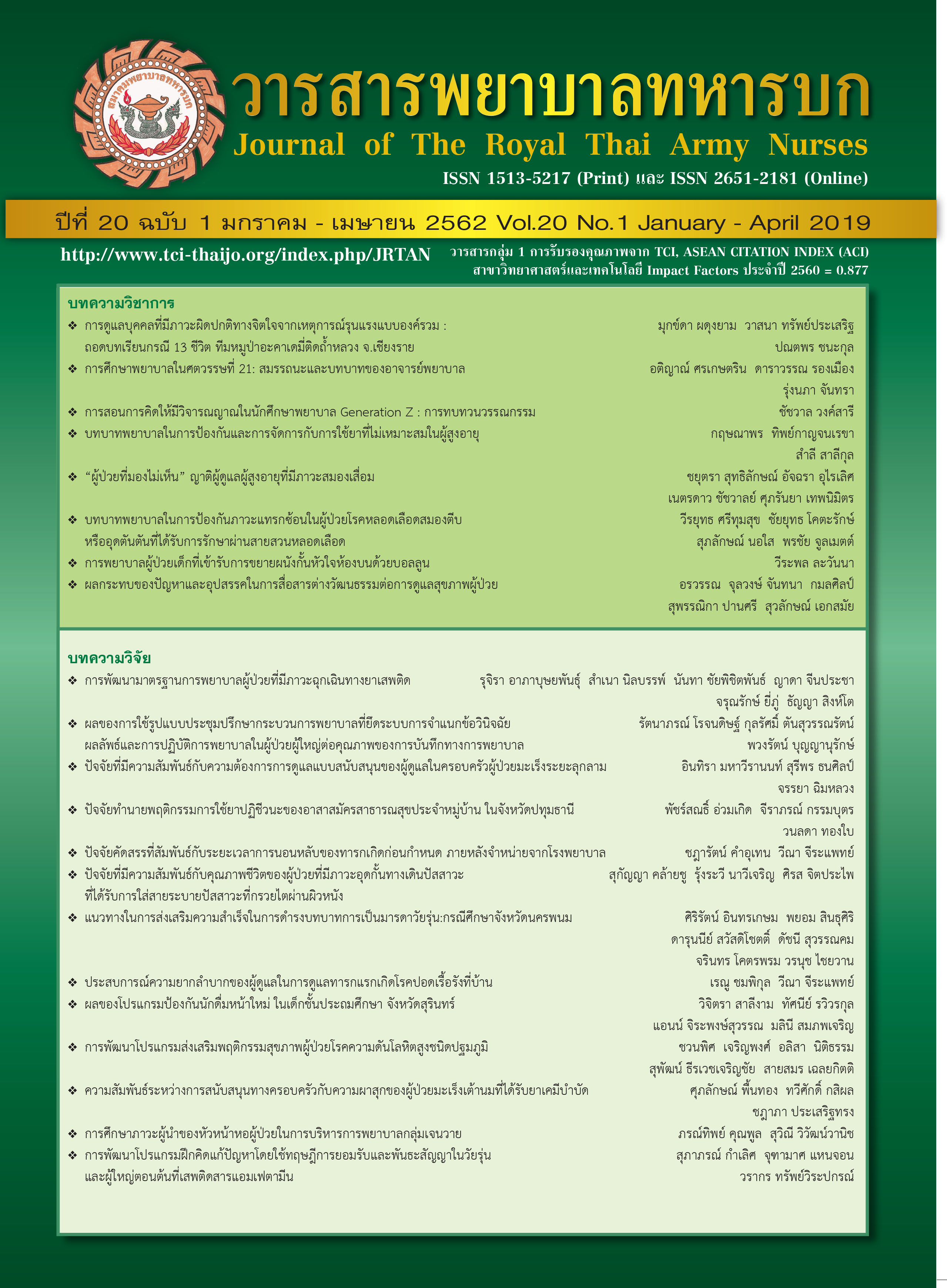Development of Problem Solving Training Program Based on Acceptance and Commitment Therapy in Adolescents and Young Adults with Amphetamine Addiction
Keywords:
Problem solving training program, Acceptance and Commitment Therapy, Amphetamine addictionAbstract
The aimed of this research were to develop the Problem solving training program based on Acceptance and Commitment Therapy in adolescents and young adults with amphetamine addiction (PST-ACT) and to test the effectiveness of the PST program. The sample consisted of 30 men with amphetamine addiction, in Pianpitak Drug Free House, Amphoe Phanom Sarakham, Chachoengsao, age 14-25 years old. The sample was randomized by using random assignment and matching into two groups: an experimental and a control group, 15 persons in each group. The research instruments were 1) the PST-ACT program, which was design by the researcher. 2) The Social Problem Solving Inventory Revised-short from: SPSI-R short from Thai version. 3) The Wisconsin card sorting (WCST-64). The experimental group received the PST program 3 times per week and the control group received the drawing activities during the same period. The assessments were done in 3 phases: pretest, posttest and follow-up. The data were statistically analyzed by utilizing a repeated measures analysis of variance and paired-different test by Bonferroni method. The results revealed that the interaction between the experimental methodology and the dura amphetamine addiction in the experimental group had the mean score of problem solving higher the those in the control group in the posttest and follow-up with statistically significant at .05 level. Adolescents and young adults with amphetamine addiction in the experimental group had the mean score of problem solving in the posttest and follow-up higher than the pretest with statistically significant at .05 level. It was concluded that the PST-ACT program had the effectiveness on enhancing problem solving in adolescents and young adults with amphetamine addiction.
Downloads
References
Volkow, N. D. Drugs, Brains, and Behavior: The Science of Addiction. Journal of Drug Addiction, Education and Eradication 2011; 7(3): 133-155.
Wongpanarak, N. & Chaleoykitti, S. The Role of the Nurse in Addiction Counseling, Journal of The Royal Thai Army Nurses 2018; 19(1): 16-23. (In Thai)
Haenjohn, J. Cognitive psychology. Bangkok, Grandpoint, 2018b. (In Thai)
Haenjohn, J. Acceptance and commitment therapy. Bangkok, Grandpoint, 2018 a. (In Thai)
Haenjohn, J. A Development of Acceptance and commitment training program on enhancing social problem solving of undergraduate students. Journal of Faculty of Education 2015; 25(3): 98-112. (In Thai)
Kongs, S. K., Thompson, L. L., Iverson, G. L., and Heaton, R. K. Wisconsin Card Sorting Test®-64 Card Version: Professional Manual. Odessa, FL. Psychological Assessment Resource. 2000.
Howell, D. C. Statistical Methods for Psychology (6thed). Australia: Thomson/Wadsworth, 2007.
Garland, E. L., Hanley, A. W., Baker, A. K., & Howard, M. O. Biobehavioral mechanisms of mindfulness as a treatment for chronic stress: An RDoC perspective. Chronic Stress 2017; 1: 1-14.
Halliburton, A. E. & Cooper, L. D. Applications and adaptations of Acceptance and Commitment Therapy (ACT) for adolescents. Journal of Contextual Behavioral Science 2015; 4(1): 1-11.
Franco, C., Amutio, A., Mañas, I., Gázquez, J. J., & Pérez-Fuentes, M. C. Reducing anxiety, geriatric depression and worry in a sample of older adults through a mindfulness training program. Terapia psicologica 2017; 35(1): 71-79.
Gendron, B., & Haenjohn, J. The informal to formal learning development of emotional capital for sustainable citizenship development, in P. Cunningham & N. 2010.
Haenjohn, J. A development of executive functions of the brain of adolescent by integrative learning modules. Journal of Faculty of Education, 2017; 28(2): 130-144. (In Thai)
Haenjohn, J., Sirithadakunlaphat, S., & Supwirapakorn, W. Development of training on promoting executive functions of the brain in adolescent, Journal of The Royal Thai Army Nurses 2018; 19(2): 220-229. (In Thai)
Downloads
Published
How to Cite
Issue
Section
License
บทความหรือข้อคิดเห็นใดใดที่ปรากฏในวารสารพยาบาลทหารบกเป็นวรรณกรรมของผู้เขียน ซึ่งบรรณาธิการหรือสมาคมพยาบาลทหารบก ไม่จำเป็นต้องเห็นด้วย
บทความที่ได้รับการตีพิมพ์เป็นลิขสิทธิ์ของวารสารพยาบาลทหารบก
The ideas and opinions expressed in the Journal of The Royal Thai Army Nurses are those of the authors and not necessarily those
of the editor or Royal Thai Army Nurses Association.






